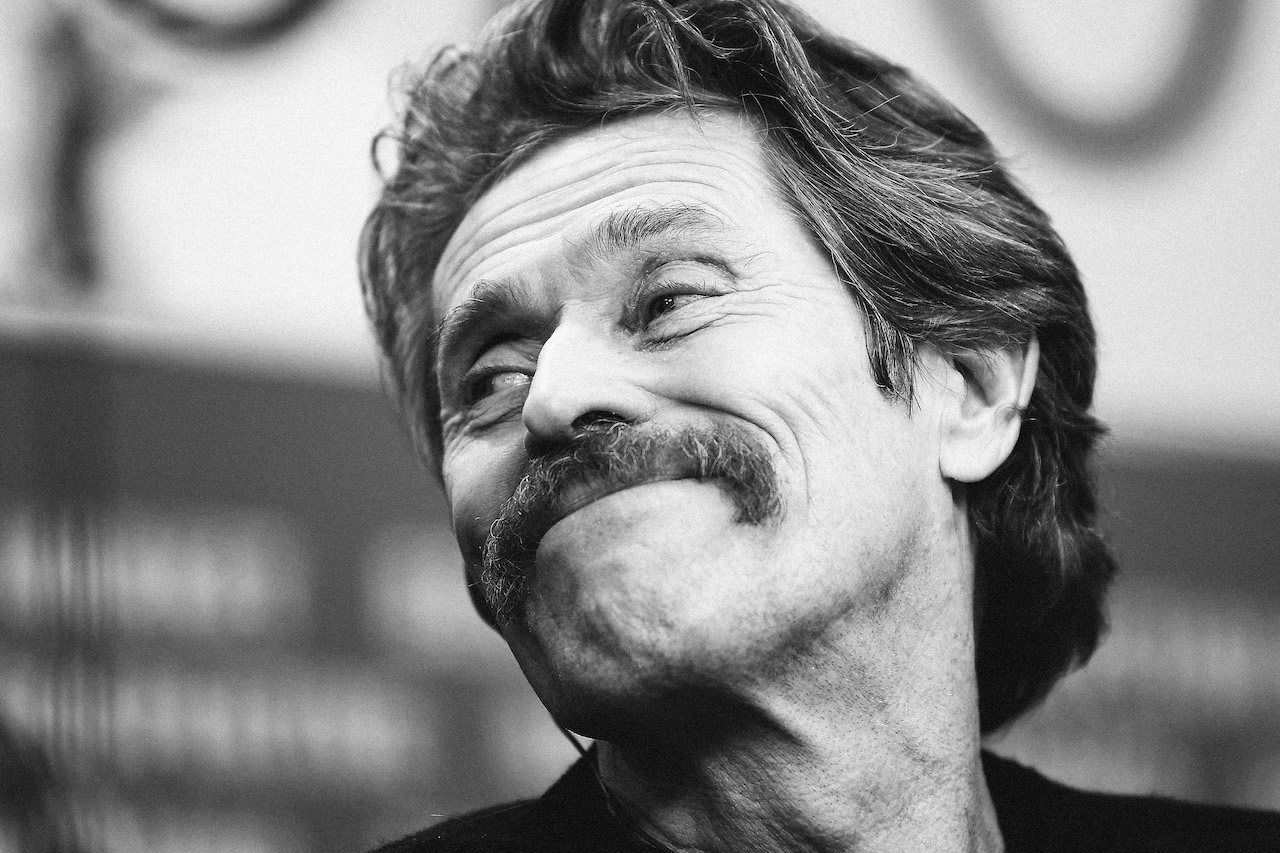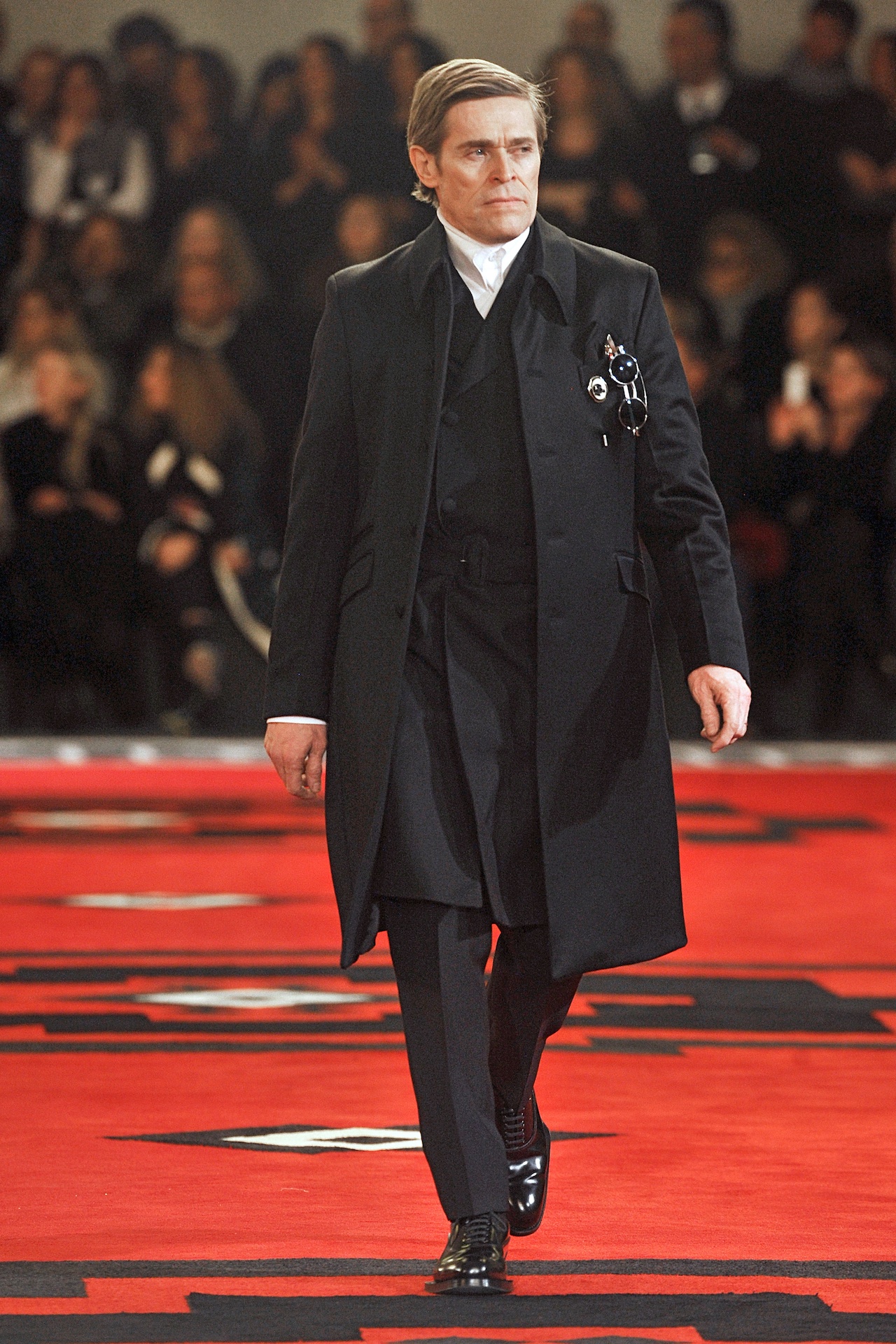

Words by Claudia Catalli
That deep voice, the green eyes, the craggy face of a rockstar. Before us is Willem Dafoe, Hollywood’s king of transformation, who is just as comfortable in blockbusters such as Spider- Man: No Way Home and Aquaman as he is in more complex auteur films.
His resume speaks volumes: no one else has played such a range of tormented and unforgettable characters. He has been the painter Vincent van Gogh, the writer Pier Paolo Pasolini, and even Jesus Christ. His portrayal of the scientist Godwin Baxter, who brings Emma Stone back to life in “Poor Things,” was darker still; it will reach theaters in January and premiered at the 80th Venice International Film Festival. Reacting to Stone’s character, Bella Baxter, critics immediately lauded the film as feminist, saying it changes the way we tell women’s stories. Rarely before now had there been such convincing representations of female desire and sexuality, and it’s the scientist played by Dafoe – a product of the highly chaste Victorian era – who resurrects Bella, albeit from a male perspective.
The actor also gave a masterful performance in Wes Anderson’s “Asteroid City,” which reached theaters September 14. He was in Venice as part of the cast of Saverio Costanzo’s “Finally Dawn,” in which he plays American gallerist Rufus Priori; the film was selected to compete for the Golden Lion.
This interview with Dafoe took place right before Hollywood’s actors and writers went on strike, which is why we couldn’t ask him about his most recent projects. Fortunately, however, the actor was able to share many little-known facts about his career and his life in Italy. He is married to director Giada Colagrande and lives in Rome.

You have appeared in over 140 movies. How do you do it?
I still love my job as much as I did the day I started. Acting makes me feel alive.
When you’re offered a role, what criteria do you use in deciding whether to accept it or turn it down?
I like to work with filmmakers who have a personal vision. I’m happy for them to use me as an instrument. I hide all traces of myself and let myself engage with the stories of the characters they ask me to play.
Do you do your own stunts?
I always pursue authenticity. I’m convinced that as an actor, you’re only believable if you’re real. So, if I can, I do everything that’s required for a character. Physical training is an integral part of an actor’s work and I’m a beast in that sense, I dive into the most reckless sequences. Don’t get me wrong, I’m not saying this to be “macho,” I’m just saying it as an actor who understands that the human body is a fundamental means of expression in this line of work.
What do you do when you’re not working?
The truth of the matter is that work is my favorite hobby. I spend time reading scripts and daydreaming about my characters. I’m always busy.
You never stopped, not even during the pandemic?
No, I kept working. I’m not so much obsessed with work as with my passion, and I chose this job precisely because it was everything I ever wanted to do. That’s why after all these years I still wake up every morning with the same enthusiasm for what I do.
I know you practice yoga. Do you have any other tips for keeping energy and enthusiasm high?
Worry as little as possible about things you can’t change.
Such as the passage of time?
For example, yes.
Doesn’t the future of filmmaking worry you at all, given concerns about the impact of streaming?
I’m not against streaming platforms. On the contrary, they make art-house cinema and independent films more accessible to a lot of people around the world, and they allow us to view works that are unknown or impossible to find. But seeing a movie in the theater is something else; it’s a shared experience with the stranger sitting next to you.
Is there anyone you feel obliged to thank for your success as an actor?
It’s not easy for me to answer that question. I can say there are directors who believed in me and gave me the chance to show what I knew how to do.
For example?
Walter Hill, who gave me my first real studio experience. He cast me in my movie debut, “Streets of Fire,” and allowed me to experience a variety of fun stuff on set.When he offered me the chance to shoot a western 40 years later [Editor’s note: Dead for Dollar], I accepted immediately, and discovered that neither of us had changed.
And your friend Wes Anderson?
With him I have a hard time calling it “work,” because beyond admiring what he does, I like spending time with him. His form of cinema is very close to an artisan craft. It’s impossible to get bored with a director who is so full of creativity and talent.
They say your meeting with the Italian director Sergio Leone didn’t go so well.
I was a big fan of his movies, until one day he came to the press presentation of The Last Temptation of Christ and said, referring to me: “This is not the face of our Lord, this is the face of Satan!” Let’s just say that his comment left me with feelings that aren’t exactly positive.
When you’re asked to take on a historical character, such as Jesus, Pasolini or van Gogh, how do you approach the task at hand?
I immerse myself in the study of their lives and works, not with the goal of imitating them, but to pay tribute to them, with great humility. My work tends to be intense and visceral, so that sometimes I start to look like the character I’m playing. People are surprised and tell me: “You know, you really look like that person!”
“My work tends to be intense and visceral, so that sometimes I start to look like the character I’m playing.”
You even started painting to play van Gogh.
Painting was essential to tell his story, so I learned how to do it and honed my skills. I always enjoy exploring new means of expression.
What stayed with you about Pasolini?
His poetry, his cinema, his visionary nature, and political reflections. They’re something that still inspires me to move forward, and I find that they’re a motivating force for everyone, anywhere in the world.
What remains of these great geniuses today?
The brilliance of their art, their love for culture, that existential mix of impatience and passion, the restlessness expressed in an unfulfilled dream of returning to simple and sacred things. The example they set in knowing how to follow many different paths and be comfortable both with the cultural elite and kids off the street. But most of all, the ability to scandalize people while also inspiring them and making them think.
Translated from the Italian by Cynthia Martens













